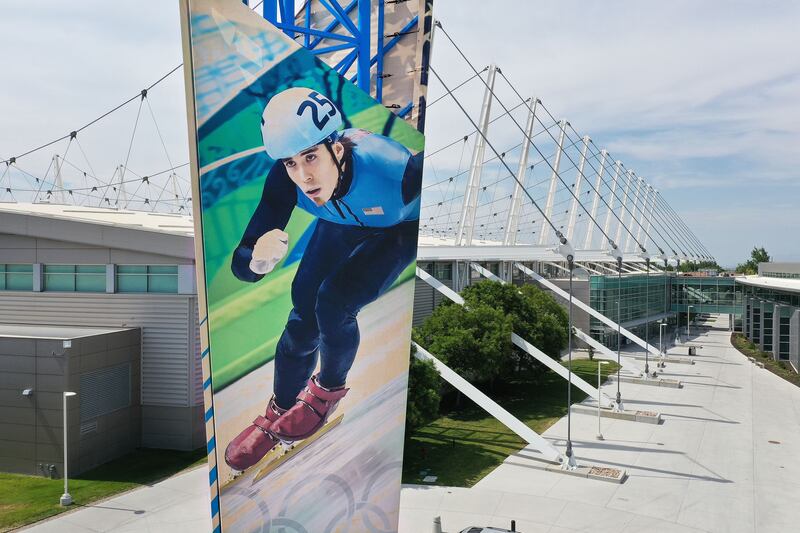Utahns may know soon whether Salt Lake City is bidding for the 2030 or 2034 Winter Games.
While the U.S. Olympic & Paralympic Committee was expected to wait until after the 2022 Winter Games that begin in Beijing next February to make that decision — largely because the 2020 Summer Games now underway in Tokyo were delayed a year due to COVID-19 — that timeline appears to have been accelerated.
Discussions with the USOPC have been on hold since the organization chose Salt Lake City, the host of the 2002 Winter Games, over Denver in December 2018 to bid for an unspecified, future Winter Games. But that’s changing, said Fraser Bullock, the president and CEO of the Salt Lake City-Utah Committee for the Games.
“There may be some initial conversations informally that can start happening as the (Tokyo) Games move forward but post-Tokyo we can dive into deeper conversations, even though Beijing is but six months away, which makes the load on the USOPC still very challenging,” Bullock said.
Still, he’s hopeful just which Winter Games Salt Lake City is seeking will be settled before Beijing.
“I think it’s a possibility. I don’t know if it’s more likely, but I think it’s a possibility. It’s something we would hope to accomplish. That’s new,” Bullock said. “We understand that they have a full plate and we will work with them as best we can, but it would be our hope that before Beijing we can make a selection of which Games to pursue.”
Utah bidders are “very, very interested in 2030,” he said, adding it’s too soon to make a prediction. That choice is complicated by Los Angeles hosting the 2028 Summer Games because of the potential negative impact that back-to-back Olympics in the United States could have on domestic sponsorship revenues.
Bullock said both Utah bidders and the USOPC “have the same objective of doing the right thing for Team USA and Salt Lake City, Utah. It’s putting the pieces together that’s complicated. We’ve been working diligently at that for several months. We’re hopeful that our conversations will bear fruit this fall.”
When asked during a news conference in Tokyo about a U.S. bid for the 2030 Winter Games, USOPC Chairwoman Susanne Lyons pointed out the International Olympic Committee will have a say in what Olympics the U.S. pursues.
At least three other cities have expressed interest in 2030 — Sapporo, Japan; Vancouver, Canada; and Barcelona, Spain. All are also previous Olympic hosts. And while the IOC has already named Brisbane, Australia, host of the 2032 Summer Games, there’s no schedule for the 2030 pick under a new, less formal bid process.
“We haven’t had any significant active discussion about the winter bids beyond the next Games,” Lyons said. “However, we are poised and ready. Salt Lake City is so excited and so supportive of the notion of having the Winter Games returned to the U.S. and we will probably be having some conversations.”
She said IOC officials are “very well aware of our readiness and our desire to bid. I think it’s somewhat their call to think about what other countries are interested and when do they want us to bid if they want us to bid, but we are prepared and ready.”
Without expressing a preference between 2030 and 2034, the USOPC chair said the organization thinks “Salt Lake City would be an outstanding candidate for Winter Games, and we want to welcome them back to the U.S. as soon as we can.”
Utah’s bid team did not travel to Tokyo to mingle with IOC members because of the ban placed on Olympic spectators to slow the spread of COVID-19 in Japan. The USOPC’s public interest in broaching the Winter Games bid during the Tokyo Games is seen as a significant step.
“I think Salt Lake would be a pretty attractive bid,” said Mark Conrad, a professor of law and ethics and director of the sports business concentration at Fordham University’s Gabelli School of Business in New York City, although he sees Sapporo and Vancouver as “strong competition” for 2030.
After the troubled Tokyo Games, the IOC may be ready to move quickly, too, Conrad said.
“The IOC might be concerned about finding good host cities in the future and want to lock them in,” he said, especially with the controversy over China’s human rights record against Uyghurs and other Muslims already putting pressure on the upcoming Winter Games in Beijing.
Some, including Utah Sen. Mitt Romney, who headed the 2002 Winter Games in Salt Lake City, are pushing for a diplomatic and economic boycott of Beijing. Conrad said the human rights issues are putting Olympic sponsors, particularly those banking on an image of social responsibility, “in a real bad position.”
Having a U.S. bid city lined up for the 2030 Winter Games before Beijing “could be attractive to get and keep sponsors” for future Olympics, he said, adding that they’ve “got to be prepared for some real criticism on that. Those are very serious human rights violations.”
Utah bidders are keeping their distance from Beijing.
“I would say Beijing stands alone and separate from our efforts,” Bullock said. “We just have our heads down, working to make progress on this. We believe the timing is such we could have a decision before the end of this year, or before Beijing but the actual hosting of Beijing is independent of the work we’re doing.”
Getting a decision on 2030 versus 2034 sooner rather than later is a boost to the bid, he said.
“Just momentum. We’ve done a lot of work. We have a lot of public support,” Bullock said, adding bidders are still working on detailed plans including budgets for both Winter Games. “Behind the scenes, we have to make sure the pieces are going to work.”


